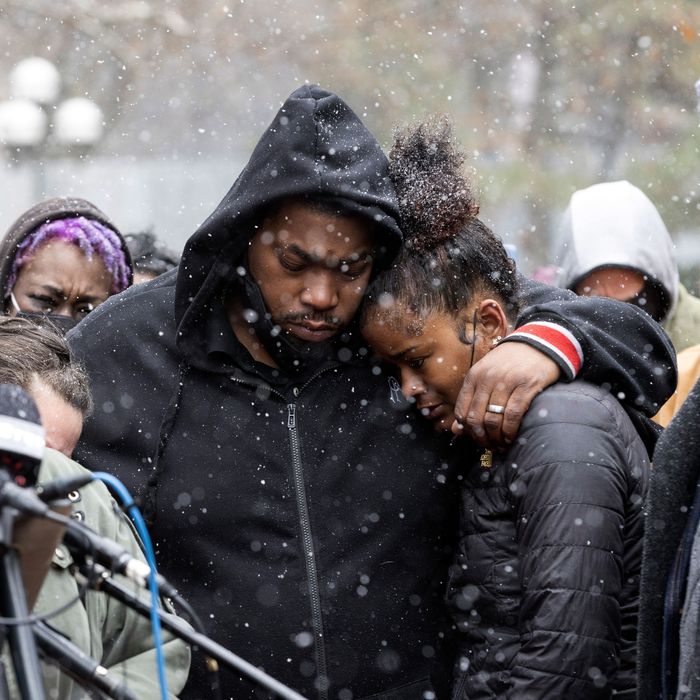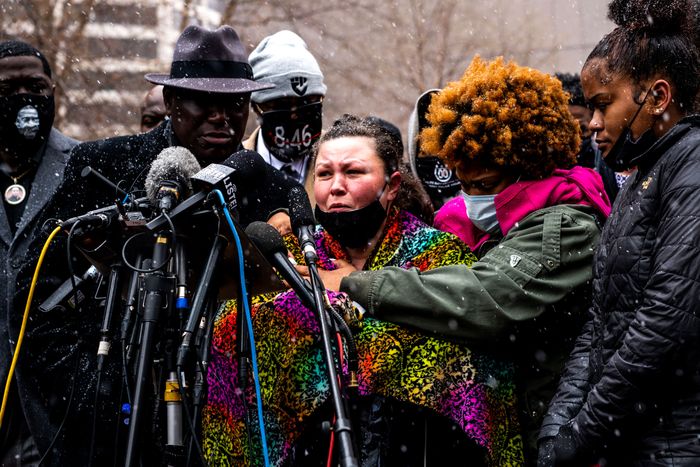
Keno Evol had bought gas masks for people in Minneapolis to protest a potential not-guilty verdict in the trial of Derek Chauvin, the former police officer charged with murdering George Floyd. Then another Black man was killed by police, just ten miles away.
“When we lost Daunte, the gas masks had to be used earlier than expected,” he said.
Police violently responded to protests for Daunte Wright in Brooklyn Center, the Minneapolis suburb where the 20-year-old was killed, firing tear gas and rubber bullets at crowds of people. After a summer of unrest following Floyd’s death, community members knew what to do immediately after another police killing. They started donating money and bringing diapers and nonperishable food to Wright’s family, including his 2-year-old son, and members of his community.
“It reminds us that not only do we always have to stand in readiness for the state and for police officers, but we also need to stand ready for each other and show up for each other,” said Evol, the founder of the Black Table Arts co-operative. “Even in the context of Black pain, we combated by showing up for each other.”
Protests started the night Wright was killed and have been ongoing since. By the 7 p.m. curfew each night, protesters have filled the streets of Humboldt Ave. outside the Brooklyn Center Police Department’s headquarters. On Monday, 40 people were arrested, police said. By Tuesday night, the National Guard lined the police station, ringed with chain-link fencing and armored vehicles. That night, there were more than 60 arrests, according to state police. The protests showed no sign of slowing down ahead of a prosecutor’s decision to file manslaughter charges against Kim Potter, the 26-year veteran police officer who was training a new cop when she shot and killed Wright.
During a vigil Monday night where Wright was killed, more than 500 people gathered to express that same pain for Wright that many felt less than a year ago when Floyd was killed. “Even before we could finish saying his name, we had to add another one to the list,” said Dewayne Davis, the pastor of Plymouth Congregational Church in Minneapolis and one of several clergymen who spoke.
“We’re not going to let you take our brother away from us and forget. We’re not going to forget to say his name, and every time you see us, you’re going to hear us say it again,” Davis told the crowd.
They gathered in front of a large wooden statue of a raised Black fist that had been moved there from George Floyd Square. The memorial that took place for Wright was in many ways similar to the one held for Floyd — people made the same calls and expressed the same frustration they had last summer, just singing a new name. “Daunte Wright is my little brother,” they chanted.
Wright’s aunt said at a press conference Tuesday with Floyd’s family that Floyd’s girlfriend was once Wright’s teacher — going to show just how small the Black community is in the Twin Cities.
“If anything happens to anybody, either you know them personally or you know someone that knows someone that knows them,” said 22-year-old activist Isak Douah “I know people personally who’ve met George Floyd.”
Douah has been in the streets protesting and volunteering since last summer, including volunteering as security for George Floyd Square. Since the start of the Chauvin trial last month, he’s shifted toward focusing on the mental wellness of Black youth with a podcast.
Isak’s father, Remi Douah, has felt the same duty. A mental-health professional, he brings a folding chair to a place just outside the artist-made graveyard near where Floyd was killed to offer counseling. “The idea came as a result of so many people coming out of this experience watching so many representations of dead bodies and feeling like saying something,” Douah said, seated in front of mock tombstones bearing names of people killed by police: Jamar Clark, Philando Castille, George Floyd, Dolal Idd, and soon Daunte Wright.
“I usually ask about three questions: What makes you happy? When was the last time you were happy? What were you doing? And then how together can we bring it back?” Douah said.
Douah started an organization called 846S to address mental-health issues in the Black community in the midst of coping with trauma from police violence — named for the eight minutes and 46 seconds that Chavin knelt on Floyd’s neck. (Prosecutors now say it lasted even longer, nine minutes and 29 seconds.)
“There’s one person who I spoke to who blew my mind in terms of what healing means,” he said. “Healing means we don’t need to live in a food desert, healing means that we need to have access to a good living and paying wages, healing means addressing the social determinants of health.”
As the Chauvin trial wraps up, with the prosecution having rested its case on Tuesday, and the investigation into Wright’s death continues, Douah said he will continue offering support to a community reeling from one trauma after another.































